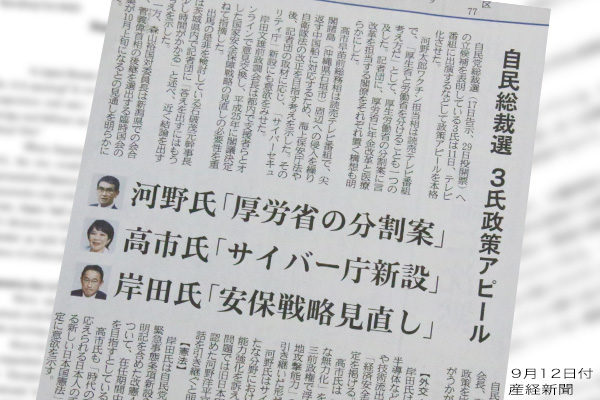On September 10, Taro Kono declared his candidacy for ruling Liberal Democratic Party’s president, joining Fumio Kishida and Sanae Takaichi. In the unprecedentedly severe national security environment, I would like to assess the three candidates’ stance and policies on national security.
Kono buried the Aegis Ashore project
In June 2020, then Defense Minister Kono cancelled a project to build Aegis Ashore ballistic missile defense systems in Akita and Yamaguchi prefectures, without proposing any alternative plan. The reason was that a used fuel tank of the first booster of an interceptor missile cannot be guaranteed to drop safely within a Ground Self-Defense Force training ground where the system would be deployed.
If a ballistic nuclear missile hits Japan, hundreds of thousands or millions of lives could be lost. I still cannot understand why he cancelled the Aegis Ashore for the reason of an event that would not be comparable to such catastrophe.
Late last year, it was decided that the Aegis Ashore systems would be on board. As their designing takes time, however, the Defense Ministry could not request budget for the systems for the next fiscal year. Their deployment would delay years behind original schedule. Can Japan respond to North Korean, Chinese or Russian nuclear attack threats with this?
It just so happened in July that a video produced by a group of Chinese military maniacs spread through the Internet over China with a narration that threatened to launch a nuclear attack on Japan immediately if Japan sends even one soldier in the event of military contingencies over Taiwan.
When Kono was defense minister, there were numerous populist events such as auctions for Self-Defense Forces goods. Asked if his policies contributed to Japan’s defense, however, I have no choice but to answer that negative contributions were more than positive ones.
Kishida supports nuclear ban while Takaichi watches out China’s political warfare
Kishida is a pacifist praising the nuclear arms ban treaty as “splendid in pursuing ideals” in his book published last year, titled “Towards the World without Nuclear Weapons – A Vision for a Courageous Peace-loving Nation.” How is Kishida prepared to counter North Korean or Chinese nuclear threats? I would like him to give specific measures.
China’s political warfare strategy to “win without fighting” is gradually intruding into Japan by involving the business community, media, scholars and students. To counter such Chinese political warfare without use of force, Takaichi proposed appropriate policies such as the enactment of a comprehensive economic security law, the screening of immigrants, the enhancement of cybersecurity, the expansion of intelligence functions, the promotion of external communications and vigilance against Chinese Communist Party organizations in Japan, when she announced her candidacy. She is different from Kono who posted a selfie he took with a Chinese Foreign Ministry spokeswoman on Twitter indicating that he could be trapped by China’s smiling diplomacy.
Several years ago, I heard from Takaichi at her office how she tried to enact a law for regulating foreigners’ acquisition of important land sites for national security when she served as minister of internal affairs and communications. In July this year, I listened to her presentation at the Constitution Memorial Center. I have felt that she has a sound national vision of Japan that the other two candidates lack.
Fumio Ota is a senior fellow and a Planning Committee member at the Japan Institute for National Fundamentals. He is a retired Vice Admiral of Japan’s Maritime Self-Defense Force.


